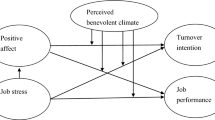Abstract
The role of behavioral intentions in predicting turnover has received considerable attention in recent years. The purpose of the present study was to examine the potential moderating impact of a person's perceptions of political tactics (PPT) on the relationship between turnover intentions and voluntary turnover. The research sample consisted of 404 white-collar employees working for a textile manufacturing firm. Logistic regression indicated support for the hypothesized moderator effect. Results suggested that turnover intentions were less predictive of turnover for individuals who perceived political tactics to be useful in attaining organizational success as compared to those who perceived them not to be useful. Future research suggestions are provided.
Similar content being viewed by others
References
Arnold, H.J., Feldman, D.J. (1982). A multivariate analysis of the determinants of job turnover.Journal of Applied Psychology, 67, 350–360.
Bass, B.M. (1968). How to succeed in business according to business students and managers.Journal of Applied Psychology, 52, 254–262.
Bass, B.M., Franke, R.H. (1972). Societal influences on student perceptions of how to succeed in organizations: A cross national analysis.Journal of Applied Psychology, 56, 312–318.
Cheung, P., Smith, H.L. (1981). Logistic regression models with continuous independent variables.American Sociological Review, 46, 946–949.
Farrell, D., & Petersen, J.C. (1982). Patterns of political behavior in organizations.Academy of Management Review, 7, 403–412.
Ferris, G.R., Russ, G.S., & Fandt, P.M. (in press). Politics in organizations. In R. Giacalone & P. Rosenfeld (Eds.),Impression Management in the Organization. Hillsdale, NJ: Erlbaum.
Fishbein, M. (1980). A theory of reasoned action: Some applications and implications. In H. Howe & M. Page (Eds.),Nebraska symposium on motivation, 27, 65–116. Lincoln: University of Nebraska Press.
Gandz, J., & Murray, V.V. (1980). The experience of workplace politics.Academy of Management Journal, 23, 237–251.
Griffin, R.W., Bateman, T.S., Wayne, S.J., & Head, T.C. (1987). Objective and social factors as determinants of task perceptions and responses: An integrated perspective and empirical investigation.Academy of Management Journal, 30, 501–523.
Hulin, C.L., Roznowski, M., & Hachiya, D. (1985). Alternative opportunities and withdrawal decisions: Empirical and theoretical discrepancies and an integration.Psychological Bulletin, 97, 233–250.
Kemery, E.R., Dunlap, W.P., & Griffeth, R.W. (1988). Correction for variance restriction in point-biserial correlations.Journal of Applied Psychology, 73, 688–691.
Madison, D.L., Allen, R.W., Porter, L.W., Renwick, P.A., & Mayes, B.T. (1980). Organizational politics: An exploration of managers' perceptions.Human Relations, 33, 79–100.
March, J.G., & Simon, H.A. (1958).Organizations. New York: John Wiley.
Mayes, B.T., & Allen, R.W. (1977). Toward a definition of organizational politics.Academy of Management Review, 2, 672–678.
McEvoy, G.M., & Cascio, W.F. (1985). Strategies for reducing employee turnover: A meta-analysis.Journal of Applied Psychology, 70, 342–353.
Mobley, W.H. (1982).Employee turnover: Causes, consequences, and control. Reading, MA: Addison-Wesley.
Mowday, R.T., Koberg, C.S., & McArthur, A.W. (1984). The psychology of the withdrawal process: A cross-validational test of Mobley's intermediate linkages model of turnover in two samples.Academy of Management Journal, 27, 79–94.
Mowday, R.T., Porter, L.W., & Steers, R.M. (1982).Employee-organizational linkages. New York: Academic Press.
Muchinsky, P.M., & Morrow, P.C. (1980). A multidisciplinary model of voluntary employee turnover.Journal of Vocational Behavior, 17, 263–290.
Porter, L.W., Allen, R.W., & Angle, H.L. (1983). The politics of upward influence in organizations. In R.W. Allen & L.W. Porter (Eds.),Organizational influence processes, pp. 408–422. Glenview, IL: Scott, Foresman.
Presholdt, P.H., Lane, I.M., & Matthews, R.C. (1987). Nurse turnover as reasoned action: Development of a process model.Journal of Applied Psychology, 27, 221–227.
Rosse, J.G., & Hulin, C.L. (1985). Adaptation to work: An analysis of employee health, withdrawal, and change.Organizational Behavior and Human Decision Processes, 36, 324–347.
Salancik, G.R., & Pfeffer, J. (1977). Who gets power and how they hold on to it: A strategic-contingency model of power.Organizational Dynamics, 5(3), 3–21.
Steel, R., & Ovalle, N. (1984). A review and meta-analysis of research on the relationship between behavioral intentions and employee turnover.Journal of Applied Psychology, 69, 673–686.
Stone, E.F., & Hollenbeck, J.R. (in press). Clarifying some controversial issues surrounding statistical procedures for detecting moderator variables: Empirical evidence and related matters.Journal of Applied Psychology.
Thompson, D.R., & Terpening, W.D. (1983). Job type variations and antecedents to intention to leave: A content approach to turnover.Human Relations, 36, 655–681.
Author information
Authors and Affiliations
Rights and permissions
About this article
Cite this article
Wesolowski, M.A., Mossholder, K.W., Feild, H.S. et al. The role of perceptions of political tactics in predicting turnover from behavioral intentions. J Bus Psychol 3, 413–422 (1989). https://doi.org/10.1007/BF01020709
Issue Date:
DOI: https://doi.org/10.1007/BF01020709




